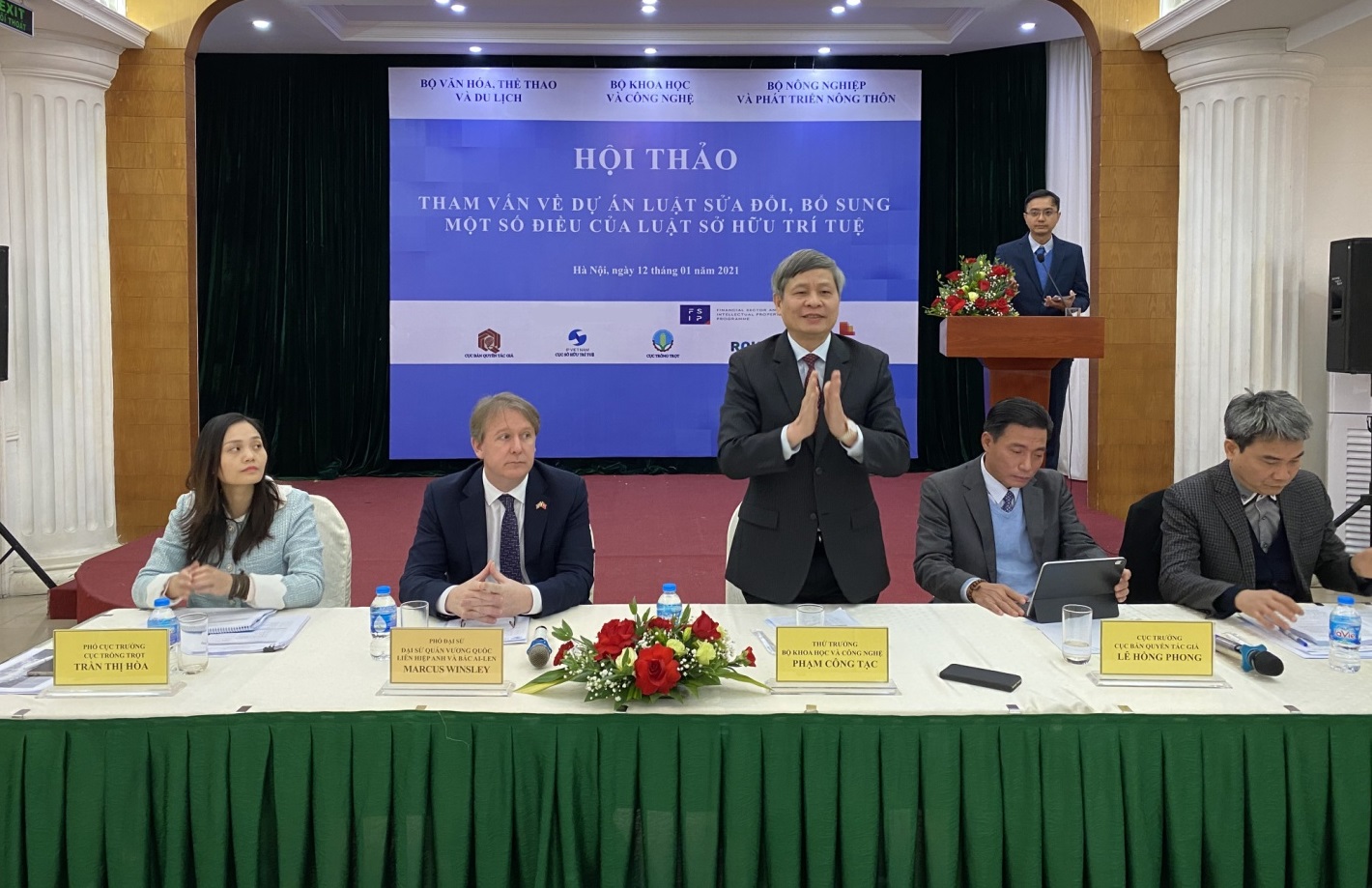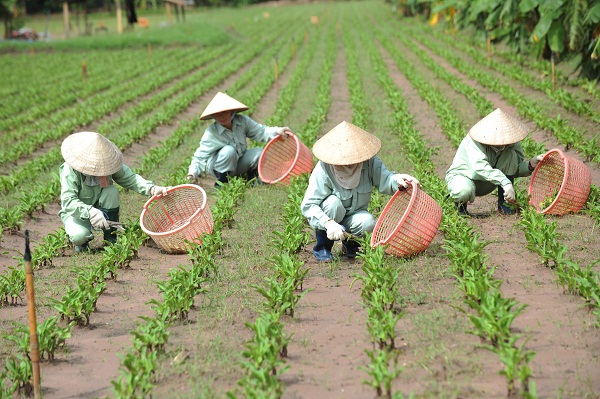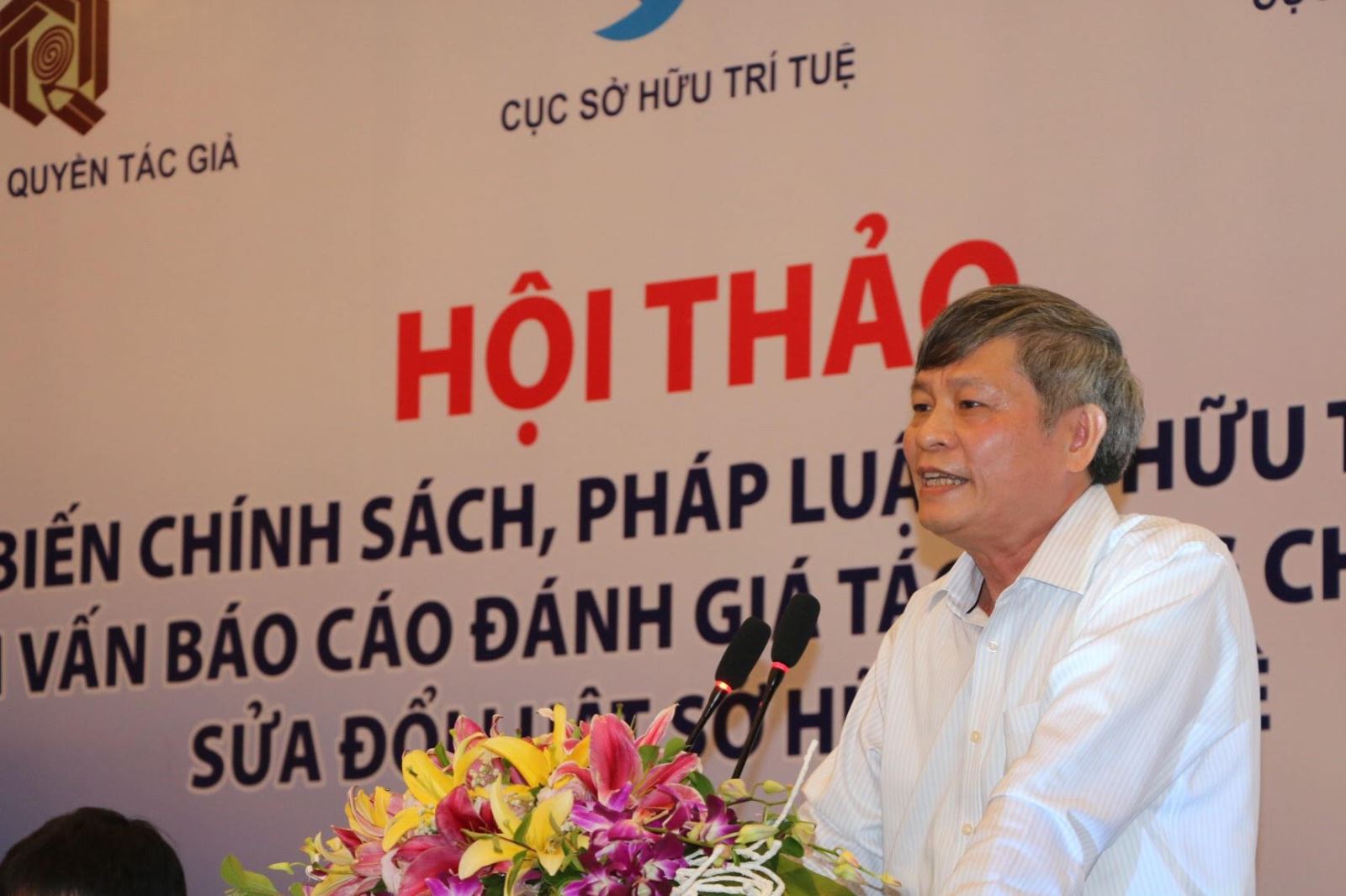1. Formulation and improvement of national legislation and policies
The requirement to continue to improve the intellectual property (IP) system has been mentioned as one of major policies of the Party and the State (Resolution No. 11-NQ/TW of the 5th Conference of the 12th Party Central Committee identified one of the tasks and solutions to improve the socialist-oriented market economy institution is “to complete the IP system in the direction of encouraging creativity, ensuring transparency and high reliability; IP rights are protected and effectively enforced”
This continued to be affirmed in the Orientation and Tasks section of the draft Report on Reviewing the Implementation of the Socio-economic Development Strategy for previous 10-year (2011-2020) and establishing the Socio-economic Development Strategy for the next 10-year (2021-2030) to submit to the 13th Nation Party Congress: complete the legal framework on IP, strengthen the protection and enforcement of IP rights).
Therefore, formulation and improvement of IP legislation and policies are always one of key tasks in IP administration work of the Intellectual Property Office of Vietnam (IP Vietnam). Significant results in in 2020 informulation and improvement of IP legislation and policies included: (i) drafting the Law amending and supplementing a number of articles of the IP Law (the Draft Law); (ii) guiding and implementing the National Strategy on Intellectual Property (NSIP) to 2030; and (iii) coordinating on the formulation of Resolution on the ratification of the Free Trade Agreement (FTA) between Vietnam and the European Union (EVFTA).

Deputy Minister of Science and Technology Pham Cong Tac, Deputy Head of Drafting Board of the Draft Law at the Workshop "Consultation on the draft Law amending and supplementing a number of articles of the IP Law”, January 2021.
Amendment of IP Law
IP Law, which was enacted in 2005, amended and supplemented in 2009 and 2019, was an important milestone in the history of building, developing and improving the IP legal system of Vietnam. So far the IP Law has created a legal framework for organizations and individuals to establish, utilize and protect IP rights, hence contributed to encourage innovation activities and promote technology transfer. However, after more than 15 years since its enactment, problems and shortcomings have also been exposed, as Mr. Dinh Huu Phi, Director of IP Vietnam shared at the "Conference on IP policy dissemination and consultation of the Report on Policy impact assessment of IP Law amendment" co-organized by the Ministry of Science and Technology, Ministry of Culture, Sports and Tourism and Ministry of Agriculture and Development Rural on October 7, 2020 in Hanoi.
On the other hand, the IP Law is required to be amended due to new commitments to the new-generation FTAs which Vietnam have just signed, as the Deputy Minister of Science and Technology Pham Cong Tac commented, if "participating in a game without following its rules, we will lose, domestically and internationally". Overall, the new context of international integration, the wave of the Industrial Revolution 4.0, the increasing trend of trade protectionism etc. have placed a practical need for the IP law to be amended.
Therefore, the goal of amending and supplementing a number of articles of the IP Law is to institutionalize the directions and policies of the Party and the policies of the State; resolve obstacles and problems in practice; transform international commitments into domestic legislation, creating a legal framework for IP activities of Vietnam; ensure the stability, unity, consistency, transparency, feasibility, accessibility, effectiveness and efficiency of the IP legal system, effectively facilitate the development of the country in a period of industrialization, modernization and extensive international integration.
To prepare for the submission of the Draft Law for comments from the National Assembly at the 2nd session of the 15th National Assembly in October 2021, IP Vietnam, as the coordinating organization with cooperation from relevant agencies of other ministries as well as judicial agencies, has prepared the draft law and sought opinions from the public by posting on official web portals of the Government and the Ministry of Science and Technology, organized consultation workshops, and sent documents to request for comments from relevant agencies, organizations and individuals.
The Draft Law focuses on 7 main groups of content:
(i) To ensure clear regulations on author, copyright owner, performers, and related rights holders in cases of assignment or licensing of copyrights, related rights: Provisions relating to determine the owner of property rights (owner, author, performer) will be more coherently and specifically clarified to facilitate the process of assignment and licensing of copyrights and related rights;
(ii) To encourage creation, exploitation and dissemination of inventions, industrial designs and layout designs funded from the State budget: Provisions relating to determine ownership rights and rights to utilize from inventions, industrial designs, layout designs that are resulted from scientific research funded by state budget will be more specified and detailed with the aim to encourage transforming research results into protected IP assets, creating a premise for a more effectively commercial exploitation of these assets in the market;
(iii) To facilitate the process of registration of copyrights, related rights and industrial property rights: In general, the proposed amendments will facilitate IP protection registration due to simpler, faster, more convenient and more transparent procedures; online registration regulations are also supplemented to be compatible with the Government's roadmap of providing online public services etc.;
(iv) To ensure an adequate and balanced level of IP right protection between the benefits of the right holders and rights of the public to use and access knowledge and technology: Proposed amendments will focus on handling issues related to the right to access works, phonograms, video recordings, and broadcasts; rationalizing patent protection mechanism; providing additional bases to patent and trademark cancelation; rationalizing the protection of plant variety rights (balancing breeders' rights and farmers' rights in keeping harvested materials);
(v) To enhance the effectiveness of supporting activities on IP (including representation and assessment activities): Proposed amendments will focus on clearer responsibility, more specific and detailed scope of operations, and eliminating a number of operation conditions to comply with the country's general administrative procedure reform;
(vi) To improve the effectiveness of IP enforcement activities: Proposed amendments will focus on solving shortcomings related to measures to handle infringements of IP rights to ensure a more effective, rational and feasible IP enforcement mechanism; improving regulations on IP rights enforcement in the digital environment; amending and supplementing a number of provisions related to the scope of border control methods for import and export goods;
(vii) To ensure an appropriate and strict implementation of Vietnam's international commitments on IP protection: Proposed amendments will focus on existing provisions in the IP Law which are not fully compatible with the commitments in newly-signed FTAs (such as the protection of test data for agrochemicals; jurisdiction of customs authorities in border control, etc.); or the missing provisions needed to supplement to comply with international commitments (such as sound trademark protection; compensation mechanism for patent owners of pharmaceutical products due to unreasonable delay in marketing authorization procedure, etc.).

Planting the Crinum latifolium trees which have been granted a plant variety protection certificate by Thien Duoc Company. Source: Thienduoc
Implementation of the NSIP to 2030
After the NSIP to 2030 was promulgated, IP Vietnam have carried out many communication and dissemination activities of the NSIP on the media as well as among ministries, agencies and localities with an aim to raise awareness of leaders at all levels and the society about the NSIP's views, objectives and tasks. Many localities have issued their own NSIP Implementation Plans while others have been implementing by integrating NSIP contents into local socio-economic development policies.
Within the science and technology sector, IP Vietnam has formulated the NSIP Implementation Plan for the period 2020-2025 to specify the tasks and solutions assigned by the Prime Minister to the Ministry of Science and Technology in the NSIP. Base on that NSIP Implementation Plan, IP Vietnam has also formulated the Assigning tasks for the subordinate units (Decision No. 1178/QD-SHTT dated April 6, 2020 of the Director General of IP Vietnam), in which a number of tasks have already started, such as: reviewing and improving IP regulations; reviewing, amending and supplementing regulations on industrial property examination guidelines, etc.
Formulating and commenting on relevant legal documents
In addition to formulating IP legal documents, IP Viet Nam also regularly provided comments on IP content in legal documents drafted by other agencies, in particular: 02 laws (Law on Investment; Dossier of Proposal to formulate the Law amending and supplementing the Law on the protection of consumers' rights); 12 decrees (Dossier of Proposal to formulate the Decree on Civil obligation fulfillment; Decree on Electronic administrative procedures; Decree on Special preferential import and export tariffs of Vietnam to implement the EVFTA; Decree on Preferential and incentive schemes and policies for the National Innovation Center; Decree on Business registration; etc.); 07 circulars (Circular guiding forms for appraisal or commenting on technology applied to investment project; Circular stipulating for marketing authorization of drugs manufactured under processing agreement, technology transfer agreement in Vietnam; Circular stipulating technical requirements for input data of the national S&T database etc.) and many other IP related legal documents.
As the focal point for State management of IP, IP Viet Nam frequently clarified and guided provincial departments of science and technology and businesses on the implementation of the IP laws and regulations, such as on: transferring foreign patent-protected technology; maintaining patent validity; submitting documents in optical disc to claim priority rights; processing trademark applications with letter of owner's consent and determining confronting marks’ legal status; denying protection of industrial property objects that contradict social ethics and public order; clarifying potential conflicts between geographical indications and previously registered trademarks, etc.
Also in 2020, IP Viet Nam has implemented a number of measures to support applicants affected by the Covid-19 such as issuing notices and applying provisions to extend time limits for establishing industrial property rights procedures (requests claiming priority, supplementing documents, responding to IP Vietnam’s decisions/notices, maintaining and prolonging the validity of protection titles, paying fees and charges, filing complaints).
2. International policy and legal frameworks
By 2020, international policy and legal framework, especially international negotiations, had achieved remarkable results in two main areas: (i) negotiation, signing, ratification; and (ii) implementation assurance of international treaties on/related to IP.
For the FTA between Vietnam and the European Union (EVFTA): After the Agreement was signed on June 30, 2019, IP Vietnam reviewed legal regulations, drafted contents related to the implementation of IP obligations and coordinated with relevant agencies to formulate a resolution of the National Assembly to ratify the agreement (Resolution No. 102/2020/QH14 dated June 8, 2020) and the Prime Minister's Decision on the Implementation Plan of the EVFTA (Decision No. 1201/QD-TTg dated August 6, 2020).
For the Regional Comprehensive Economic Partnership Agreement (RCEP) (between ASEAN and six countries: China, India, Japan, Korea, Australia and New Zealand): IP Vietnam attended the 3rd legal review session of the RCEP Agreement in New Zealand. The Agreement was signed online by 15 participating countries on November 15, 2020.
For the VN - EFTA FTA (European Free Trade Association Association including Switzerland, Lichtenstein, Norway and Iceland): IP Vietnam attended online IP session in the framework of the VN - EFTA FTA negotiation.
For the Agreement between Vietnam and the United Kingdom (UKVFTA): IP Vietnam gave comment on the proposal of the Ministry of Foreign Affairs on the proposal of the UK and the European Union (EU) to allow the UK to implement international treaties signed by the EU with Vietnam during Brexit transition period; attended the working sessions of the Working Group of Trade and Investment Dialogue Vietnam-UK. On December 29th, 2020, the UKVFTA was officially signed in the UK.
For the Budapest Treaty on the International recognition of the deposit of microorganisms for the purposes of patent procedure (commitment under the CPTPP): IP Vietnam researched and formulated the Accession Plan and Accession Dossier. The Accession Dossier was submitted and ratified by the Government.
International agreement implementation activities on IP continued to be regularly and sufficiently performed, such as on: Providing information on the IP protection and enforcement in 2019 at the request of the US Embassy in Hanoi (Special Report 301); Reviewing the provisions of the Criminal Code 2015 and related laws with commitments under the CPTPP; Attending the 3rd Session of the Joint Commission on the Implementation of the FTA between Vietnam and the Eurasian Economic Union (VN-EAEU FTA), etc.
Especially, 2020 was the year Vietnam must proceed on trade policy reviewing at the WTO, yet due to the influence of the Covid-19, the review session was postponed to 2021. However, IP Vietnam have coordinated with other agencies to carry out preparations for the coming trade policy review session, including: provided additional information for the second trade policy review of Vietnam to the WTO Secretariat; drafted IP contents in the National Report on Trade policy; commented on the draft Report of the WTO Secretariat on Vietnam's Trade policy.

|
The international integration context has set out an urgent requirement to amend the IP Law. The Draft Law will have to conform to commitments in international treaties to which Vietnam is a member (EVFTA, CPTPP, The Hague Agreement) as well as international treaties to which Vietnam will accede (WCT Agreement, WPPT Agreement, Budapest Treaty).
|